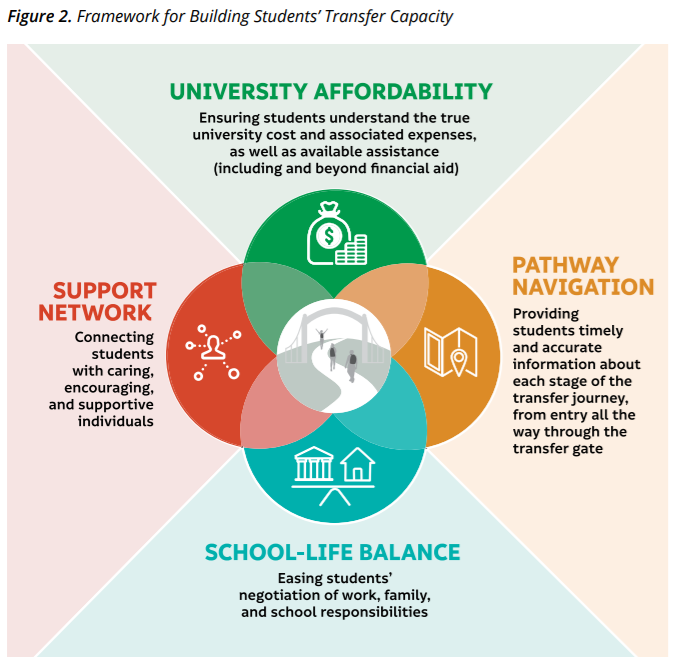I intentionally did not include COVID-19 specific research in this month’s blog because I felt that it was readily available through other outlets. Instead, I uncovered a few interesting research reports on: a relatively new assessment model (REM); new research on gender differences in the participation rate of low-achieving students in PECS; an analysis of the effects of tuition resets on enrollment; and a report on factors that impact why California community college students who appear ready to transfer do not do so. I hope you find them as interesting as I do.
AACRAO Research Update
Stranded Credits, Transfer Credit Evaluation Policy and Practice
AACRAO is working on a series of research projects with WICHE, ITHAKA and ACE, all related to how and if earned credits transfer and student access to those credits. On June 24, some of you will receive an invitation to participate in a two-part survey, one focused on stranded credits and the other a detailed look into transfer credit evaluation policy and practice.
Students with unpaid balances often cannot access official transcripts or re-enroll. (California postsecondary institutions are a known exception to this practice as of January 2020). “Stranded credits” refers to the accumulated credits for which a student is unable to obtain an official transcript due to an administrative hold. ITHAKA and AACRAO are conducting this research to better understand the prevalence of stranded credits, the reasons student cannot access their credits, and policies and procedures related to this issue. We recognize that this is a potential barrier across sectors and institution types, and we will use this research to develop workable solutions that benefit all stakeholders.
Recent research on transfer students’ perceptions about credits lost in transfer points to transfer credit evaluation practice/policy and academic advising practice/policy as two areas where there is likely room for changes that would help transfer students. AACRAO has collected high-level data related to these areas for other projects. Part two of this survey aims to benchmark and examine the nuances of policy and practice.
Change Management in Higher Education Report and Webinar
The Change Management in Higher Education report was released on June 1st and is available here. In these times of previously unheard-of levels of forced changes in policy and practice, this report will provide insights into how institutions have been successful in managing change pre-COVID-19. We hosted a webinar on this report June 24th. This is the link to view the recording.
Prior Learning Assessment Webinar
The webinar on the prior learning assessment project with WICHE, Lumina and others is scheduled for July 15th.
Current Higher Education Research and Related Topics
Four Essential Factors Impacting Potential Transfer Student Readiness
The RP Group completed a two-part research project on students in the California Community College system who, by their course taking success, looked prepared to transfer to a four-year institution but did not. The researchers identified four essential factors to help build students’ transfer capacity (see figure 2 from the report below).

Source: https://rpgroup.org/Portals/0/Documents/Projects/ThroughtheGate/RPGroup_TheTruthAboutTransfer_TTGPhase3_R3%5B79%5D.pdf?ver=2020-05-18-171449-773
Encoura – Considerations for Resetting Tuition
Ten years of tuition data from NCES related to resetting prices was analyzed for post-change enrollment patterns (see figure 1 from the document below). The researcher concludes that there are three things to consider before resetting tuition:
“Your students are highly sensitive to affordability.
Your institution is seeing declining enrollments and/or increasing discount rates.
You are reinventing your educational offerings to bring greater value to students.”

Source: Figure 1
An Application of Ripple Effect Mapping
Ripple Effect Mapping (REM) is an evaluation method described as participatory, iterative and inclusive. This method was applied to a first-year academic advising course at Cornell as a means to learn if the course met its intended outcomes from the vantage of the participants. Authors of the white paper believe REM fills a gap in assessment practice.
Academic Achievement Does Not Explain Why There are Fewer Women in PECS than Men
A new peer reviewed study of gender participation in physics, engineering and computer sciences (PECS) from the journal Science was summarized at Phys.org. Researchers examined seven years of data for more than 6,000 students from the start of high school to their junior year in college. They found a higher percentage of low-achieving men participate in PECS than compared to women of the same achievement level, which “cannot be explained by an extensive set of student-level factors proposed in the prior literature.” However, researchers are able to explain the gap in high-achieving students. They suggest that without being able to identify the cause of the difference in participation rate in the low-achieving students by gender that “it is unlikely that the PECS gender gap will fully close.”
EDUCAUSE Study of the Technology Needs of Students with Disabilities, 2020
The authors analyzed open-ended student survey responses to the question “What is ONE thing you would like your instructors to do with technology to enhance your academic success?” Two primary themes emerged:
A desire for online access to materials and resources, and
For instructors to incorporate technology in teaching on several levels